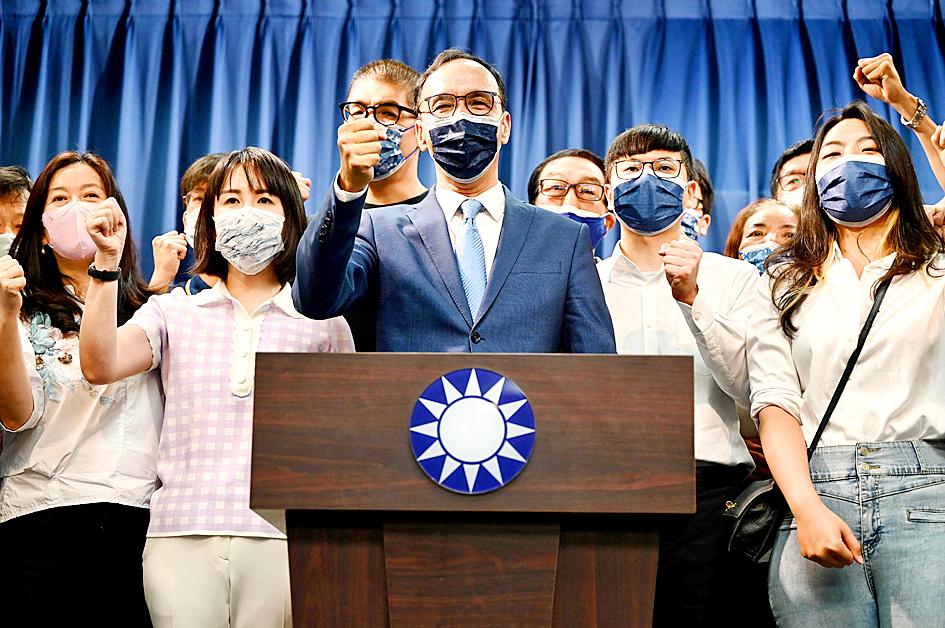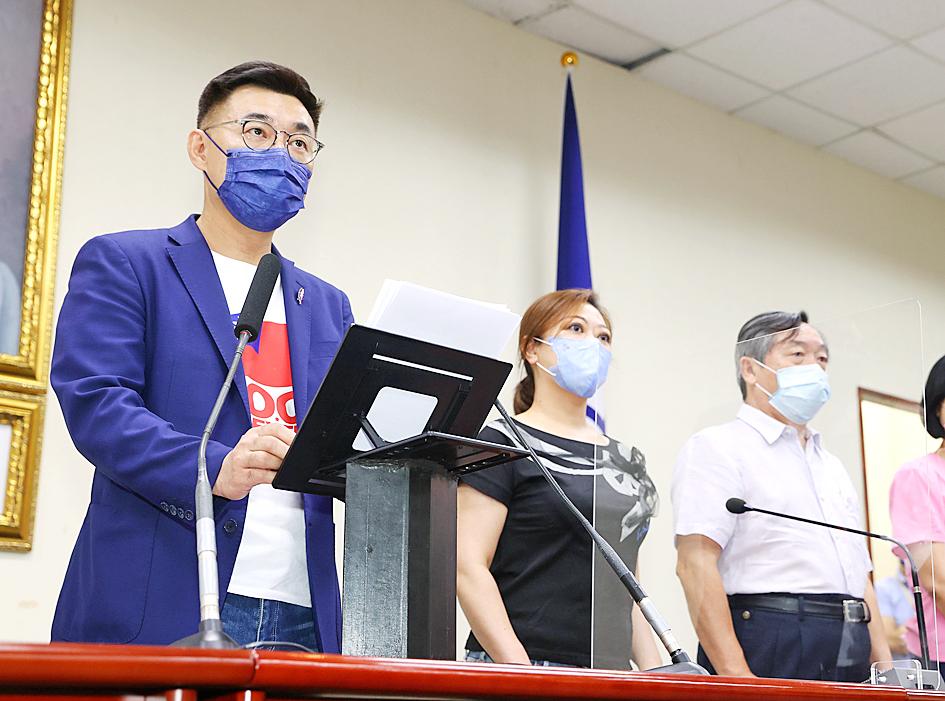Former New Taipei City mayor Eric Chu (朱立倫) was yesterday elected Chinese Nationalist Party (KMT) chairman in a four-way race that included outgoing chairman Johnny Chiang (江啟臣).
Chu, 60, garnered 85,164 votes, or 45 percent of the 187,998 KMT members who cast ballots. Sun Yat-sen School president Chang Ya-chung (張亞中) trailed behind with 60,632 votes, followed by Chiang with 35,090 votes and former Changhua County commissioner Cho Po-yuan (卓伯源) with 5,133 votes. Voter turnout was 50.71 percent.
This will be Chu’s second time heading the party. He was elected KMT chairman in an unopposed by-election in January 2015 and resigned in January 2016 following the party’s losses in the presidential and legislative elections.

Photo: Sam Yeh, AFP
In his victory speech yesterday, Chu said his election would be the start of the Democratic Progressive Party’s (DPP) worries.
“The KMT will unite in an unprecedented manner, and we will fight for the pan-blue camp’s decisive victory,” he said. “We will fight for people’s rights and resist the DPP’s overbearing and aggressive behavior.”
Asked by reporters what his approach would be to relations with China, Chu said the Taiwan-China relationship is “very important,” and that he would strive to open all channels of communication with China.

Photo: CNA
Chu also reiterated his intention to open a KMT representative office in the US.
Chu added he would travel across Taiwan to gather feedback on ways to improve the party from his supporters and detractors alike.
He would seek to restore confidence in the KMT and encourage involvement of young people in the party’s improvement, he said.
Following the election results yesterday evening, Chiang at the KMT headquarters in Taipei led party officials in resigning en masse and tasked KMT caucus secretary-general Lee Yen-hsiu (李彥秀) with handling the handover of the party leadership to Chu.
Chiang said that despite his personal loss in the election, he felt the results to be demonstrative of a “democratic test for the party, which is a win for everyone.”
Chiang offered his congratulations to Chu and thanked the other two candidates for their participation in the election.
His next step would be to campaign across the nation to garner support for two referendums sponsored by the KMT that are to be put to a vote in December, he said, adding that he would also work to encourage more young people to participate in the party’s improvement.
Chang said the results were "very regretful," but that he also felt he had "taken the first step on the path toward rousing the party spirit."
"This is the foundation that will carry the party forward," he said. "We must persevere in carrying out Sun Yat-sen’s (孫逸仙) political ideology. Otherwise we can’t be called the KMT."
His second-place election result demonstrated party supporters’ affirmation of his ideals and behavior, he added.
The results of the chairperson election is to be delivered to the party’s decisionmaking Central Standing Committee for confirmation on Wednesday. Chu is to assume office at the KMT National Congress on Oct. 30.
DPP spokeswoman Chien Shu-pei (簡舒培) congratulated Chu on his election win and said the DPP hoped Chu would work together with the administration in the spirit of public will and toward public benefit.
DPP Legislator Lin Chun-hsien (林俊憲) said that Chiang’s defeat in the election meant a rejection of his moderate leadership, while the rapid rise of Chang and his strong performance in the election meant growing support among KMT supporters for unification with China.
Although Chu won the election, the KMT would come under increasing pressure from unification supporters, he said.
Additional reporting by Chen Yun, Hsieh Chun-ling and CNA

The Central Election Commission has amended election and recall regulations to require elected office candidates to provide proof that they have no Chinese citizenship, a Cabinet report said. The commission on Oct. 29 last year revised the Measures for the Permission of Family-based Residence, Long-term Residence and Settlement of People from the Mainland Area in the Taiwan Area (大陸地區人民在台灣地區依親居留長期居留或定居許可辦法), the Executive Yuan said in a report it submitted to the legislature for review. The revision requires Chinese citizens applying for permanent residency to submit notarial documents showing that they have lost their Chinese household record and have renounced — or have never

A magnitude 5.6 earthquake struck off the coast of Yilan County at 12:37pm today, with clear shaking felt across much of northern Taiwan. There were no immediate reports of damage. The epicenter of the quake was 16.9km east-southeast of Yilan County Hall offshore at a depth of 66.8km, Central Weather Administration (CWA) data showed. The maximum intensity registered at a 4 in Yilan County’s Nanao Township (南澳) on Taiwan’s seven-tier scale. Other parts of Yilan, as well as certain areas of Hualien County, Taipei, New Taipei City, Taoyuan, Hsinchu County, Taichung and Miaoli County, recorded intensities of 3. Residents of Yilan County and Taipei received

Taiwan has secured another breakthrough in fruit exports, with jujubes, dragon fruit and lychees approved for shipment to the EU, the Ministry of Agriculture said yesterday. The Animal and Plant Health Inspection Agency on Thursday received formal notification of the approval from the EU, the ministry said, adding that the decision was expected to expand Taiwanese fruit producers’ access to high-end European markets. Taiwan exported 126 tonnes of lychees last year, valued at US$1.48 million, with Japan accounting for 102 tonnes. Other export destinations included New Zealand, Hong Kong, the US and Australia, ministry data showed. Jujube exports totaled 103 tonnes, valued at

BIG SPENDERS: Foreign investors bought the most Taiwan equities since 2005, signaling confidence that an AI boom would continue to benefit chipmakers Taiwan Semiconductor Manufacturing Co’s (TSMC, 台積電) market capitalization swelled to US$2 trillion for the first time following a 4.25 percent rally in its American depositary receipts (ADR) overnight, putting the world’s biggest contract chipmaker sixth on the list of the world’s biggest companies by market capitalization, just behind Amazon.com Inc. The site CompaniesMarketcap.com ranked TSMC ahead of Saudi Aramco and Meta Platforms Inc. The Taiwanese company’s ADRs on Tuesday surged to US$385.75 on the New York Stock Exchange, as strong demand for artificial intelligence (AI) applications led to chip supply constraints and boost revenue growth to record-breaking levels. Each TSMC ADR represents